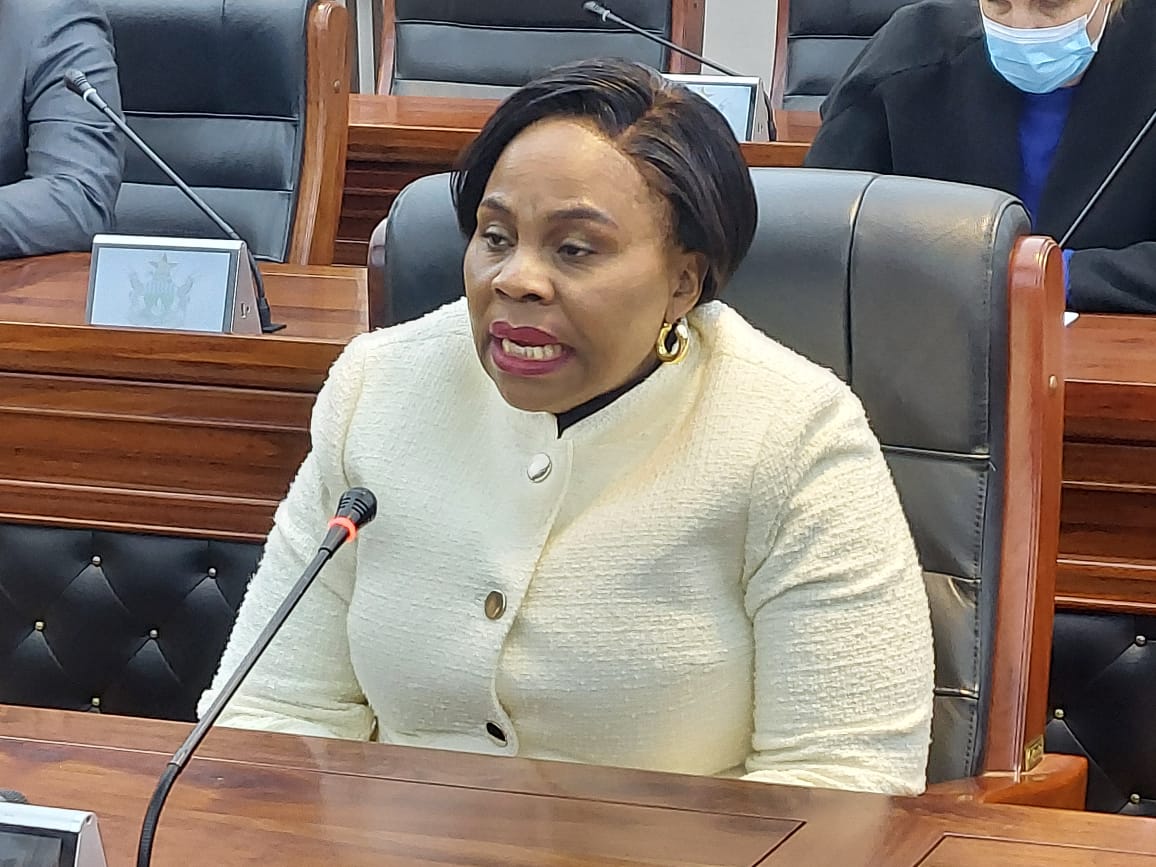
- ZIMBABWE’S RESPONSE TO THE COVID-19 PANDEMIC, AND REPORT ON THE PROCUREMENT AND ROLLOUT OF VACCINES
Cabinet received an update on the Country‘s Response to the Covid-19 Pandemic and a Report on the Procurement and Roll-Out of Vaccines, as presented by the Chairman of the Ministers’ COVID-19 National Committee, Vice President and Minister of Health and Child Care, Honourable Dr. C.G.D.N. Chiwenga.
The nation is advised that, as at 11 July 2022, the country’s cumulative COVID-19 cases stood at 255 981, with 249 723 recoveries and 5 565 deaths. The recovery rate was 98%, with 693 active cases having been reported. The overall number of new COVID-19 cases continued to decrease, with 227 cases having been recorded during the week, compared to 383 recorded the previous week, marking a 41% decline.
An average of 32 new cases was recorded per day, compared to 55 new cases the previous week. This trend of declining cases confirms that the pandemic remains under control. The public is however urged to continue adhering to COVID-19 prevention measures, which have largely contributed to the pandemic being under control.
Regarding the national vaccination programme, Cabinet wishes to inform the nation that, as at 11 July 2022, a total of 6 332 448 first doses of the COVID-19 vaccine had been administered, while 4 683 952 people had received their second dose, and 908 444 their third dose.
This translates to a national coverage of 56.3%, compared to the 56.1% recorded the previous week. The nation is informed that vaccination activities continue to be intensified in all health facilities and all those who have not received these doses are encouraged to visit their nearest health centres for vaccination.
Cabinet wishes to assure the public that the country’s response to the COVID-19 pandemic remains on track. Efforts continue to be strengthened to increase vaccination coverage. Cabinet has therefore approved the following measures:
- that vaccination activities must continue to be intensified in order to bridge the gap between 1st and 2nd dose coverage so as to reach herd immunity coverage before the end of the year; and
- that the country must remain vigilant for monkeypox by continuing to strengthen monkeypox surveillance and information dissemination.
- UPDATE ON THE MARKETING OF SUMMER GRAINS, COTTON AND TOBACCO, AND ON THE WINTER WHEAT PRODUCTION SEASON
Cabinet considered and adopted the fortnightly Update on the Marketing of Summer Grains, Cotton and Tobacco and on the Winter Wheat Production Season, as presented by the Minister of Lands, Agriculture, Fisheries, Water and Rural Development, Honourable DR. Anxious Jongwe Masuka.
Cabinet informs the nation that, as at the 7th of July 2022, the Grain Marketing Board (GMB), had 454 277 metric tonnes of maize and traditional grains in stock, including stocks carried over from the previous season.
- Chamisa under fire over US$120K donation
- Mavhunga puts DeMbare into Chibuku quarterfinals
- Pension funds bet on Cabora Bassa oilfields
- Councils defy govt fire tender directive
Keep Reading
Due to the late onset of rains experienced in the 2021/2022 summer production season, the main grain intake season begun in June 2022 and is likely to peak around July to September. Accordingly, a total of 28 430 metric tonnes of grain has been received during the current grain marketing season.
In the meantime, the importation of mealie-meal will continue in order to ensure that consumers are cushioned from any market distortions which may occur. Government calls upon farmers to desist from side-marketing their grain. So far 392 metric tonnes have been confiscated by the GMB for side marketing in terms of Statutory Instrument 145 of 2019. Meanwhile wheat stocks stand at 54 268 metric tonnes, which are sufficient to meet local requirements.
In terms of payments, a total of ZW$500 million and US$ 2 million has been paid to farmers for grain delivered to the GMB. Producers are encouraged to deliver early so that they take advantage of the incentive for early deliveries granted by Government.
Regarding wheat production, Cabinet confirms that the 78 038 hectares planted this year is a new record for the country, surpassing the previous record of 70 585 hectares set in 2004. The fertilisers, chemicals and fuel in stock are sufficient to meet production requirements. Furthermore, 100 megawatts of electricity have been ring-fenced for farmers and farmers are exempt from load shedding.
For quelea bird control, the Department of Migratory Bird Control has adequate stocks of the required chemical, and the Zimbabwe National Geo-Spatial Space Science Agency (ZINGSA) will carry out control operations using drone technology. A Command and Control Centre has been established to ensure better mapping, tracking and control of quelea this season.
Pertaining to tobacco, a total of 165 million kilogrammes of the crop valued at US$501 million have been sold to date, compared to the 181 kilogrammes worth US$500 million sold during the similar period of 2021. The average price for auction and contract floors is US$3.02 per kilogramme, compared to US$2.76 per kg in 2021. Contract floors outside Harare account for 35% of the total tobacco sold. Auction sales will close on 20 July 2022, following which mop-up sales will be conducted, while contract sales will continue until all the tobacco has been sold.
"The Ministry of finance @ZimTreasury does not give waivers to shops to sell in whatever currency. We have got policy, we have got the law and the law should be followed," Professor Mthuli Ncube @MthuliNcube #PostCabinetPressBriefing pic.twitter.com/PKpT2NzMH2
— Ministry of Information, Publicity & Broadcasting (@InfoMinZW) July 12, 2022
So far, tobacco merchants have exported 78 449 301 kilogrammes of tobacco valued at US$379 228 509, up from the 67 759 734 kilogrammes worth US$267 213 732 exports during the similar period of 2021. The average export price for the golden leaf is US$4.85 per kg, compared to US$3.94 per kg last year.
On the marketing of cotton, Cabinet wishes to highlight that 366 permanent and 377 mobile buying points have been established across the country’s cotton growing areas. To date, 15 512 710 kilogrammes of seed cotton have been purchased at the common buying points across the country valued at US$4 658 813 and ZW$504 988 630. Producers are invited to note that Statutory Instrument 118 of 2022 has now been promulgated to:
- strengthen compliance, with hefty penalties being imposed for side-marketing;
- establish support for farmers, common inputs distribution and cotton buying points; and
- promote value addition by farmers and contractors.
- NATIONAL YOUTH SERVICE POLICY GUIDING FRAMEWORK AND NATIONAL YOUTH SERVICE IMPLEMENTATION MATRIX: 2021-2025
Cabinet considered and approved the National Youth Service Policy Guiding Framework and National Youth Service Implementation Matrix: 2021-2025, as presented by the Minister of Public Service, Labour and Social Welfare, chairperson of the Social Services and Poverty Eradication Committee, Honourable Paul Mavima.
The nation is informed that the National Youth Service Policy provides a framework for grooming well-disciplined youth, who exhibit Zimbabwean values and identity by 2030. The framework is informed by:
- the Zimbabwe Constitution;
- the Zimbabwe Youth Council Act (Cap 25:19);
- the National Development Strategy 1: 2021-25;
- the National Youth Policy: 2020-2025;
- the African Youth Charter (2006); the Declaration on Youth Development and Empowerment in SADC (2015) and
- the National Gender Policy (2013-2017).
It is anchored on six key principles, namely:
- patriotism;
- discipline;
- unhu/ubuntu;
- tolerance;
- respect; and
These core values play an integral part in the moulding of a well-cultured and disciplined youth as envisaged.
Cabinet wishes to inform the nation that recruitment into the National Youth Service Training Programme will be voluntary. The Programme will be called “Youth Service in Zimbabwe,” and will closely coordinate with the Life Skills Orientation Programme offered by the Ministry of Primary and Secondary Education. Training intakes will be advertised both in the print and electronic media.
Cabinet approved the National Youth Service Policy Guiding Framework & National Youth Service Implementation Matrix. The policy provides a framework for grooming well disciplined youth, who exhibit Zimbabwean values & identity by 2030. This is voluntary https://t.co/hSmPtoC4Dh
— Ministry of Information, Publicity & Broadcasting (@InfoMinZW) July 12, 2022
The recruitment will ensure equitable distribution of opportunities; equitable regional representation; and equitable gender representation. There will be two training intakes per year, with the duration of each training session being six months. The graduates of the National Youth programme will receive first priority into high institutions of learning including Polytechnics, teaching, nursing, the army and employment in the civil service.
The nation is further informed that four of the country’s provinces have no training centresat the moment. Some of them have since availed land for the construction of these centres in their respective provinces, while those with training centres have allocated more land for income generating projects.
The allocated land will form the basis of the production units of the training centres. A total of six National Youth Training Centres will be refurbished, while a further 15 new training centres will be constructed during the 5-year period. It is envisaged that a total of 100 000 youths will be trained.
- COMPENSATION FRAMEWORK FOR 2009 INSURANCE POLICY HOLDERS AND PENSION SCHEME MEMBERS AND SUPPLEMENTARY COMPENSATION BY GOVERNMENT
Cabinet considered and approved the Compensation Framework for 2009 Insurance Policy Holders and Pension Scheme Members and Supplementary Compensation by Government, as presented by the Minister of Finance and Economic Development, Honourable Professor Mthuli Ncube.
The nation will recall that following the adoption of the multi-currency regime in 2009, there was public outcry over loss of value by insurance policy holders and pension fund members. Public complaints pointed to lack of transparency in the manner in which their long-term contracts were converted from the ZW$ to US$ in 2009.
In response to the public complaints, Government commissioned the Justice Smith Commission of Inquiry in 2015, which culminated in a detailed report which was submitted in 2017 and adopted by Cabinet in 2018. In September 2018, Government then mandated the Insurance and Pensions Commission (IPEC) to implement the recommendations of the Justice Smith Inquiry.
Cabinet wishes to highlight that significant progress has been registered in implementing the recommendations, including the following:
- the legislation governing insurance and private occupational pensions funds which forms the backbone of an effective regulatory and supervisory framework, has been reviewed. The Bills to amend the Insurance and Pensions Commission Act, the Pension and Provident Funds Act and Insurance Act are at different stages of consideration in Parliament. The amendment Bills will address all strategic deficiencies in the legal framework as identified by the Commission of Inquiry.
- The regulatory and supervisory capacity of the Insurance and Pensions Commission has been enhanced through increasing the head count from 26 staff members in 2017 to the current 118. The staff complement has been diversified to include the various required skills set, such as actuarial, legal, accounting, economics, risk management, insurance and pensions competencies.
- The necessary regulatory frameworks and systems were put in place in line with international benchmarks and risks that are peculiar to Zimbabwe’s insurance and pensions industry.
- Oversight of corporate governance, risk management and investment management in pension funds and insurance companies was improved for the protection of policyholders and pension scheme members.
- Sector-specific guidance was provided to the insurance and pensions industry following the 2019 currency reforms in order to ensure seamless transition of long-term contracts denominated in foreign currency to ZW$ without prejudice to policyholders and pension scheme members.
- Visibility of the pensions and insurance regulator has been enhanced through consumer education and public awareness programmes.
The Compensation Framework outlines the processes required to achieve an objective and transparent compensation exercise. This ensures that prejudiced members of insurance policies and pension funds get reasonable benefits, while simultaneously maintaining stability and confidence in the industry.
Life insurance policies and pension contracts that will be eligible for the re-calculation of the benefits paid in the industry include the following:
- With-Profit Insurance Policies;
- Investment Contracts or Cash Accumulation Policies;
- Unit-linked Policies;
- Inflation-indexed Policies;
- Unilaterally Terminated Funeral Contracts;
- Terminations due to Currency De-basing;
- Guidance on Stopped Premiums; and
- Pension Products.
The targeted beneficiaries of the compensation are policyholders of life savings products and pensioners whose benefits were due or paid during the years 2000 to 2010. This is the period during which the macro-economic fundamentals had the most adverse impact on long-term savings contracts. The period 2009 to 2010 is meant to deal with conversions that took place in response to currency reforms.
Funding for the compensation exercise will be obtained from the following sources:
- Re-allocation of assets from within a pension fund to address the challenge of transfer of value from older generation contributors to younger generations which has been caused by inflation;
- Compulsory 10% levy on assets for self-administered funds to address the misallocation of those that exited pension funds in a depressed market condition and leaving part of their assets in the fund;
- Levy of 10% on the Bonus Smoothing Account of guaranteed funds of life insurance companies that administered pension funds in 2009;
- 15% levy on shareholder profits of life insurance companies that offered savings products during the period targeted for compensation; and
- Shareholder assets where unfair transfer of assets from policyholders to shareholders is proved.
In recognizing the prejudice suffered by pensioners and policy holders, Cabinet has approved that Government contributes US$175 million towards the pre-2009 compensation to partly cover for the loss of value suffered. This will also bring closure to this long outstanding matter.
Cabinet further highlights that draft regulations to bring legal force to the compensation framework are now in place. The regulations will be issued in terms of the Insurance Act and the Pensions and Provident Funds Act. The regulations outline the process of quantifying prejudice to members in line with the type of contract, that is, Defined Benefit, Defined Contribution, life insurance savings policies and personal pensions.
They also cover the calculation of prejudice for members of funds that converted from Defined Benefit to Defined Contribution. The sources of funding for the compensation are covered in the regulations with the exemption of Government commitment.
Compensating policyholders and pension fund members will bring closure to the compensation issue, through assured sources of funds supported by regulation. It is underscored that the insurance industry was extensively engaged by IPEC regarding the compensation framework in general and the sources of funding in particular.
- MINES AND MINERALS AMENDMENT BILL, 2022
Cabinet considered and approved the Mines and Minerals Amendment Bill, as presented by the Minister of Justice, Legal and Parliamentary Affairs, Chairman of the Cabinet Committee on Legislation, and the Deputy Attorney-General, Honourable N. Diaz.
Cabinet considered and approved the Mines & Minerals Amendment Bill. The approval represents a milestone following a protracted process, which involved extensive consultations and rigorous analysis.#PostCabinetPressBriefinghttps://t.co/hSmPtoC4Dh
— Ministry of Information, Publicity & Broadcasting (@InfoMinZW) July 12, 2022
Cabinet wishes to highlight that approval of the amendments represents a milestone following a protracted process, which involved extensive consultation and rigorous analysis. Highlights of the Bill provisions include the following:
- The Office of the Mining Cadatsre Registry and the Mining Cadastre Register recording all current mining rights and titles will be established, with the Register being freely open to all.
- The number of the various types of mining titles has been reduced to only three, namely: blocks of claims, mining lease and special grant. Blocks of claims are for local miners and should not exceed four blocks.
- The Bill will introduce a new system under which prospecting licences will be called “exclusive prospecting licences” that will restrict each licensee to prospect within a single defined area. The actual pegging and other acts of demarcation on the ground and on a map can only be done by a staking agent on behalf of the prospector, unless the prospector is also registered as a staking agent.
- A prospecting licensee will not be allowed to remove minerals from the land on which they are found, except for purposes of assaying. This clause is the first of many relating to the manner of resolving disputes between prospectors and miners on the one hand, and farmers and other landholders on the other. It sets the pattern for other clauses addressing farmer/miner disputes.
- The Bill provides for the establishment of the Mining Affairs Board with functions similar to existing Board, but having an altered composition, including miners, farmers and other stakeholders.
- Provisions of the Bill outline procedures for ensuring that the interests of farming and mining activities on land are accorded their due recognition.
- The definition of “civil penalty” defines a new kind of non-criminal penalty which will apply to the majority of infringements committed by miners. In general, mining activity is not permitted on homesteads and housing infrastructure as well as on roads and other transportation infrastructure, among others.
Generally, the Bill makes procedures under the Act more transparent.
I THANK YOU!











